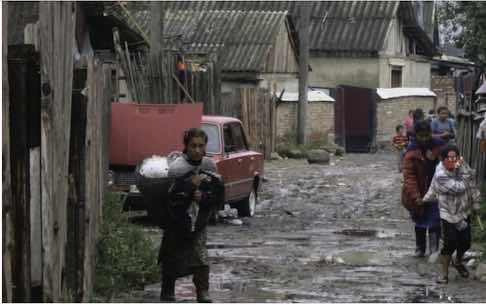
Ukrainian citizens deserve our help right now – in any way we can. But the country is not entirely blameless. It has been discriminating against minorities for some time, including alleged pogroms against the Roma population (according to Al Jazeera reports in 2018 and later).
At least 200,000 Ukrainians are headed to the UK, and the makeshift arrangements proposed by Cabinet Minister Michael Gove are well-meaning, but unlikely to suffice if the beleaguered country’s Russian occupiers settle in for the medium or long-term.
A rural retreat, however, could be the ideal tonic for a war-weary Ukrainian family when they first land here in the UK. If I was a Ukrainian, I would certainly favour Devon over London at a time when Putin has publicly placed the UK capital firmly at the top of his nuclear hitlist.
How could local communities assist the refugees, beyond making their spare rooms available for a few weeks or months? Perhaps the first formality to be completed is to clarify at a parish council level that large Ukrainian settlements are welcome in the area.
As levelling up minister, Gove is also responsible for a major reform currently underway – the empowerment of parish councils – 10,000 of them in the UK are set to become the basic building blocks of community decision making. Its part of the Brexit pledge of taking back control. Gove’s White paper, published last month, aims to give people a “sense of control in their own communities,” according to Danny Kruger, MP.
The white paper is not yet before Parliament, but if the government truly believes in its aims, then now is the time to prove it. The refugee crisis needs immediate action, and what better way to decide where to place the refugees than inviting communities to come forward with concrete proposals?
In some parts of the countryside, a new community could be a godsend. At a time when agriculture is struggling for labour to fill the gap left by Brexit, and food security has leaped up the agenda for precisely the same reason as we are expecting the refugees, what could be more appropriate than importing a new, rural labour force and giving them the means to produce what we all need – food?
Ukraine has a heavily agricultural economy – 12.5% of GDP is produced in the fields, compared to 0.5% in the UK. Wheat and vegetable oil that will now not be produced, must be supplied from other sources.
These settlements could be established quickly – in a few weeks, or a couple of months at most – as long as the Civil Service is not running it.
Using the latest technologies, we could build dozens of off-grid settlements, housing up to 300 refugees at a time, who would therefore be with their fellow-countrymen and women, rather than billeted awkwardly with kindly strangers who don’t speak their language or share their culture.
All this could be done without any need to involve central government or the utility companies.
My WhatsApp friends, and other villagers like them, could help first by identifying the sites for these settlements. There may be several thousand ideal sites in rural Britain and many more which are acceptable, though not ideal.
What is needed is a 10-acre field, preferably near a railway line so building supplies can be brought in overnight, south facing, with road access, and ideally some public transport nearby. Schools and medical facilities are not a priority. Doctors and teachers can come to the community rather than the other way around, and in any case some of the refugees will be trained teachers and nurses.
Others will be electricians, plumbers and builders, and they can be employed on day one – building the first of the simple homes that are needed. I am talking of something roughly 6 metres by 5 metres, well insulated, with second-hand windows, a small wood-burning stove, a separate composting loo, and a solar panel plus battery for the lights and phone charging. Assuming the village already has a phone mast, that will also take care of the Internet access.
Local people are being empowered to make exactly this kind of decision. I say to my Devon neighbours – use your power – take control. Bring the refugees in – your world will be larger and better as a result.
Once the first few homes are built and the people who built them moved in, they erect a community building, perhaps 12×20 meters – which acts as a meeting place, a school and a medical centre. Once that is in place, more residents can arrive, and help build more micro-homes that they will themselves move into.
Research has shown that about 100 homes is a sufficient size to begin to take advantage of economies of scale, and obtain the right mix of skills needed for a fully functioning community.
Of the 10 acres, roughly half would be used for agriculture. And the communities would be allowed to trade whatever they grew. Once they had established their credentials with the first 5 acres, they could have 5 more, and so on.
The government has already announced £350 per month for each Ukranian housed, and £10,000 per year per individual, payable to the local council. Enough to finance the idea proposed above.
If the first trial villages of just a few hundred are judged a success then more could be added.